- Home
- James Swain
The Program
The Program Read online
The Program
James Swain
Copyright © 2010 by James Swain
This book is a work of fiction. Names, characters, places and incidents are either products of the author’s imagination or used fictitiously. Any resemblance to actual events, locales, or persons, living or dead, is entirely coincidental. All rights reserved. No part of this publication can be reproduced or transmitted in any form or by any means, electronic or mechanical, without permission in writing from the author or publisher.
Edition: September 2010
Contents
Part I
Prologue
Chapter 1
Chapter 2
Chapter 3
Chapter 4
Chapter 5
Chapter 6
Chapter 7
Chapter 8
Chapter 9
Chapter 10
Chapter 11
Chapter 12
Chapter 13
Chapter 14
Chapter 15
Chapter 16
Chapter 17
Chapter 18
Chapter 19
Chapter 20
Chapter 21
Chapter 22
Chapter 23
Chapter 24
Chapter 25
Chapter 26
Part II
Chapter 27
Chapter 28
Chapter 29
Chapter 30
Chapter 31
Chapter 32
Chapter 33
Chapter 34
Chapter 35
Chapter 36
Chapter 37
Chapter 38
Chapter 39
Chapter 40
Chapter 41
Chapter 42
Part III
Chapter 43
Chapter 44
Chapter 45
Chapter 46
Chapter 47
Chapter 48
Chapter 49
Chapter 50
Chapter 51
Chapter 52
Chapter 53
Chapter 54
Chapter 55
Chapter 56
Chapter 57
Part IV
Chapter 58
Chapter 59
Chapter 60
Author's Note
Ackknowledgment
Blessed are those who hunger
and search for righteousness,
For they shall be satisfied.
Matthew 5.6
Part I
Mr. Clean
Prologue
On a beautiful spring day in 1981, Maria Devine had packed her belongings in a cheap cardboard suitcase, taken her life-savings out of her mattress, and gone to visit her baby brother Renaldo at the madhouse in Havana where he was a ward of the state.
The madhouse was called Mazorra, and was filled with Cuba’s criminally insane, the majority of whom spent every waking hour locked up in their rooms, banging their heads against the walls and screaming at the top of their lungs. Mazorra was an evil place, and Maria could not come here without welling up with emotion.
But today was different. Today, she would not cry, nor would she leave by herself, tortured with guilt. Emancipation had come for her and her brother.
“I have wonderful news,” she’d announced upon entering his room.
Renaldo Devine had sat in a wooden chair in the corner, staring dully into space. His handsome face was marred by his hair, which stuck out at odd angles from his head. He wore a canvas straightjacket, his present for having bitten one of the nurses.
“Go away,” he’d snarled.
“We’ve been approved to leave the country.”
“You are crazier than me!”
Maria had produced two passports, which she’d stuck in front of his face. One was in his name, the other in hers.
“It is true,” she said. “Look.”
He’d stared at the passports in disbelief. Another patient had told him that Castro was throwing thousands of undesirables out of the country, but he’d never dreamed that he would become a part of the exodus.
“When?” he’d asked.
“Our boat leaves this afternoon,” Maria had said. “Isn’t it exciting? I will help you pack.”
Renaldo had cried as Maria freed him. Never in a thousand years would he have imagined himself leaving this place. An hour later, he’d skipped down Mazorra’s front steps with his sister, his clothes tied in a neat bundle beneath his arm.
They’d taken a crowded bus to the port city of Mariel. Renaldo had sat backwards and watched Havana slowly disappear. Right about now, the psychologist at Mazarro would have begun their session. Each day, she’d asked Renaldo the same questions. Where did the human skull buried in his backyard come from? What had happened to the three prostitutes who’d disappeared in his neighborhood? Why did he keep a collection of hunting knives in his room? Every day, the same questions.
Why, indeed. Because he’d wanted to kill those filthy women; because it made him feel good; because he could. Those were the answers to her stupid questions. Simple as that.
Only Renaldo had known better than to answer the psychologist. Instead, he’d swayed his head back and forth, and pretended to be insane. He knew what would happen if she found out about the demon trapped inside his body. She would tell the other doctors, and they’d fill him with drugs, and give him electroshock treatments.
They’d departed the bus at the Mariel docks. There, a mob of people clutching suitcases were waiting to board the fishing boats that were taking people off the island. Renaldo had recognized other inmates from Mazarro standing in line. One was a serial rapist, another had butchered his family. Monsters, just like him.
Maria had steered him to a boat with a smiling captain on the gangplank.
“Hello, Maria. You look very beautiful today,” the captain had exclaimed. “Is this your brother? What a handsome young man.”
Maria had blushed, tongue-tied. Renaldo had stared at the bulge in the captain’s crotch. It had explained everything. His sister had bought their passage with her pussy.
When the captain had tousled his hair, Renaldo had tried to bite him.
They headed to the back of the boat. Maria made him put on a life preserver and told him she was going to the front to buy him a cold drink.
What a nice sister Maria was. She had cared for Renaldo since their mother had died. She knew her brother was broken, but still loved him. Surprisingly, he had no feelings for her. When the psychologist at Mazarro had asked him to describe their relationship, he’d declared simply, “I don’t hate her.”
Soon they were on open water. Renaldo had sat with Maria on an upturned crate, eating sandwiches she had packed for the trip. Other refugees were singing and dancing in celebration of their newfound freedom. Renaldo had felt like he was in a dream.
By nightfall they’d reached an island south of Key West. They were allowed to dock in the marina, but were told there was a backlog of boats, and that they could not be processed until morning. Food was brought on board by the Coast Guard, and the party that had started in Cuba had turned into a bigger party that lasted well into the night.
It was a night that had changed Renaldo’s life. The marina was illuminated by underwater lights that lit up the water like an aquarium. Sitting on the edge of the boat, he’d watched schools of brightly colored fish swim past. Soon a shark appeared in the marina. It had gray, sandpapery skin, a blunt head, and a mouth filled with vicious teeth. The shark appeared to be in a daze, it’s movements lethargic. Suddenly, it snatched a smaller fish that had gotten too close, and swallowed it hole. The carnage happened so quickly, the other fish in the school didn’t notice, and did not try to escape.
The shark had kill
ed the other fish all night long. In front of his eyes, he’d seen an animal kill without being caught. The trick was knowing how to fit into your surroundings, and not draw attention to yourself.
It had been a revelation for Renaldo. Right then, he’d decided to become a shark. He’d learn to blend in, and develop a killing style that was swift, and sure. He would not make the same mistakes he’d made in Havana, and get caught.
At dawn, he’d walked up to the front of the boat where Maria was dancing with the captain. They were sipping from a bottle of wine and pawing each other. They’d forgotten all about him, a fact that had infuriated Renaldo. He’d fought the urge to break the wine bottle on the side of the boat, and cut their heads off.
Instead, he’d started to clap his hands and shuffle his feet. When the dance was over, everyone on the boat had applauded. Maria had hugged him and kissed the top of his head, thinking somehow he’d been healed.
“What a wonderful boy,” the captain had said.
Renaldo had bottled up his rage toward the captain and his sister, and kept it inside for a month. During that time, he and his sister had moved to Fort Lauderdale and found an apartment. His sister had gotten a job as a waitress, and made a home for them. She had bought him new clothes and a motorbike, yet still his rage had remained.
One night over dinner, she had shown her brother a gold tennis bracelet hanging on her wrist. It was a present from her new boyfriend, she’d said. Renaldo had come around the table to have a look.
“How many times did you fuck him for that?” he’d asked.
“You ungrateful little bastard,” she’d said.
Picking up the knife from her plate, he’d grabbed his sister by the hair, and jerked her head back. Looking into her eyes, he’d kissed her forehead before slitting her throat. His new life in America had begun.
Chapter 1
FBI Special Agent Ken Linderman started his day with a run on the sandy beaches of Key Biscayne. Late August, hot and sticky, and he was the only idiot out punishing himself. Soon he was gasping for breath, the sweat pouring off his body like a man going to the electric chair. But he did not stop.
Six years before, he’d been doing laps on the dirt track at Quantico when he’d gotten the call that his daughter had gone missing. Danni was a freshman at University of Miami in Coral Gables, and had disappeared while out running near her dorm. There had been no witnesses or signs of foul play. Danni had simply stopped existing, the earth swallowing her up in one huge gulp. He’d been looking for her ever since.
Standing beneath the shade of a royal palm, he drank a bottled water and cooled down. A pretty brunette on a wind sail caught his eye. Watching her skip across the waves, he thought of his daughter and choked up. Time was supposed to heal all wounds, except that was a lie. Time was the enemy when loved ones went missing, each passing day a reminder of what might have been.
Back at his condo, he made coffee and used it to wake his wife, weaving the cup below her twitching nose. Muriel was small and fine-boned, with hair gone prematurely gray and a soft Virginia accent. Her eyelids flickered awake.
“My, what a handsome waiter,” she said.
“Good morning, madame,” he said. “How are we today?”
Muriel sipped the coffee with a brave smile on her face. She knew what this day was as well. In the kitchen, the phone rang. “You going to get that?” she asked.
“No. It’s probably work,” he said.
“Still planning to take the day off?”
“Yes. I’ve got everything planned for our little soiree.”
His wife perked up. “Tell me.”
“We’re going to take a leisurely drive to Key Largo, and have lunch at a four star restaurant called Song of the Sea that was written up. They’re holding a table for us.”
“That sounds wonderful. Do you want to shower first?”
“You go ahead. I need to cool down some more.”
The bathroom door clicked shut. Linderman stripped down to his shorts and walked out onto the balcony. The ocean breeze felt good against his overheated skin. He watched a school of brightly-painted catamarans race toward the mouth of the bay while thinking how ironic his life had become. He was a profiler, and had helped crack hundreds of cases, yet he could not solve the mystery of his daughter’s disappearance.
He had not started out wanting to be a profiler. Twenty-six years old, and fresh out of the FBI academy, he’d been doing clerical work for an agent named Robert Kessler when something called the Criminal Personality Research Project had been dropped on his desk. Kessler had been visiting prisons around the country, persuading serial killers to talk to him. Those interviews had been given to Linderman to put into cohesive form.
The job had been daunting. Kessler had talked to a hundred of the worst killers, his subjects including cannibals, blood-drinkers, necrophiliacs, crazed giants, demented stranglers, mutilators, and child-killers. There had been no simple way to group them. They were all monsters.
Linderman had decided to chronicle the killers based upon the year they’d been caught. The oldest cases would go first, the newest last. And that was when he’d noticed something no one in the bureau had seen before. Of Kessler’s killers, sixteen had been arrested between 1965 and 1975, the remaining eighty-four between 1975 and 1985. During those last ten years, the number of serial killers had dramatically increased, with an average of one being caught every six weeks.
It was nothing short of an epidemic.
Linderman had written a lengthy memo to his superiors, explaining what he’d found. It had created an uproar. The FBI was spending millions of dollars trying to catch serial killers, yet their number was rising.
No one liked the bearer of bad news. His superiors had kicked him upstairs to Behavioral Science, and told him to “go figure out the problem.” He’d become a profiler overnight.
Only being a profiler was not a job that Linderman had desired. Profilers led difficult lives, and suffered from a variety of medical problems, including bleeding ulcers, anxiety attacks, and rapid and unexplained weight loss. The medical profession called it situational stress, but the gang at Quantico had another name for it. They called it staring into the abyss.
But there had been a plus side to his new position. He’d gotten to work alongside Kessler and Douglas Johnson, two of the finest profilers the FBI had ever produced. They’d taught him the ropes, and over time, Linderman had learned how to cope with the nightmares and health issues, and had started catching serial killers like no one before him. It was his calling, and he might have kept doing it until retirement, only Danni had gone missing.
For four years, Linderman had searched for his daughter while working at Quantico. Then, out of frustration, he’d moved to South Florida with his wife, and taken a job running the Child Abduction Rapid Deployment unit in the FBI’s North Miami office. It was a step down in both pay and stature, but he didn’t care. He was determined to find out what had happened to Danni, no matter what the cost.
Muriel came onto the balcony in a bathrobe, her hair dripping wet. He put his arm around her shoulder and started to kiss her.
“You got a phone call. Several, actually.” She sounded angry.
“I’m sorry.”
“It was Vick. She asked that you call her right away.”
“I’m not working today, remember?”
“It sounded urgent.”
“What about my plan to run away for the day?”
“Oh, Ken, I don’t know.”
He lowered his arm. Muriel looked out of sorts. The day had caught up to her, just like it’d caught up to him during his run. His dream of running away to Key Largo suddenly seemed awkward and foolish. Muriel would stay in the condo, bury herself in a romance novel or watch the programs she’d Tivoed, while he’d go throw himself in a case. It was what their lives had become, and there was no escaping it.
“Are you sure you want to be here by yourself?” he asked.
“I can manage,�
�� his wife replied.
“That’s not what I asked you.”
She nodded stiffly. Her brave face was back. It said she’d manage just fine.

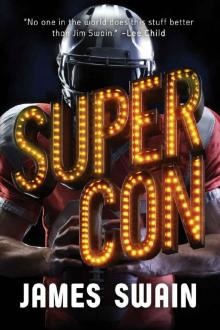 Super Con
Super Con The Program
The Program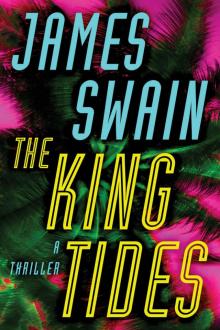 The King Tides (Lancaster & Daniels Book 1)
The King Tides (Lancaster & Daniels Book 1)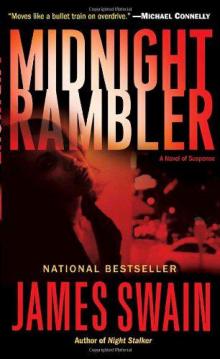 Midnight Rambler
Midnight Rambler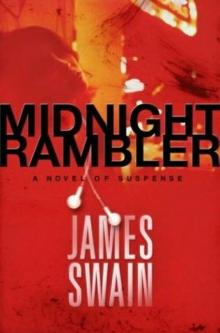 Midnight Rambler jc-1
Midnight Rambler jc-1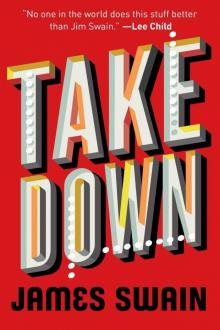 Take Down
Take Down The Program (Jack Carpenter series)
The Program (Jack Carpenter series) Dark Magic
Dark Magic Wild Card (Tony Valentine Series)
Wild Card (Tony Valentine Series) Mr. Lucky
Mr. Lucky Deadman's Poker: A Novel (Tony Valentine)
Deadman's Poker: A Novel (Tony Valentine) The Night Stalker jc-2
The Night Stalker jc-2 Loaded Dice tv-4
Loaded Dice tv-4 Loaded Dice
Loaded Dice Mr. Lucky tv-5
Mr. Lucky tv-5 Shadow People
Shadow People Jackpot tv-8
Jackpot tv-8 The Man Who Cheated Death (Vincent Hardare)
The Man Who Cheated Death (Vincent Hardare) Gift sense tv-1
Gift sense tv-1 Jackpot (Tony Valentine series)
Jackpot (Tony Valentine series) Grift Sense
Grift Sense Deadman's Bluff
Deadman's Bluff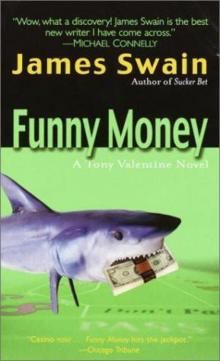 Funny Money tv-2
Funny Money tv-2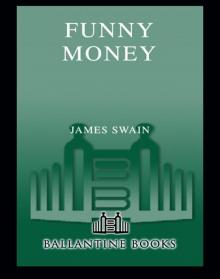 Funny Money
Funny Money The Night Monster
The Night Monster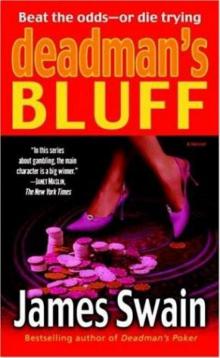 Deadman's Bluff tv-7
Deadman's Bluff tv-7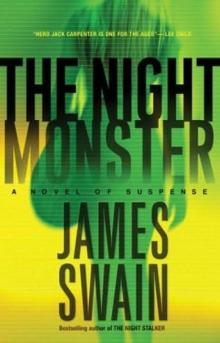 The Night Monster jc-3
The Night Monster jc-3 The Night Stalker
The Night Stalker Sucker Bet tv-3
Sucker Bet tv-3